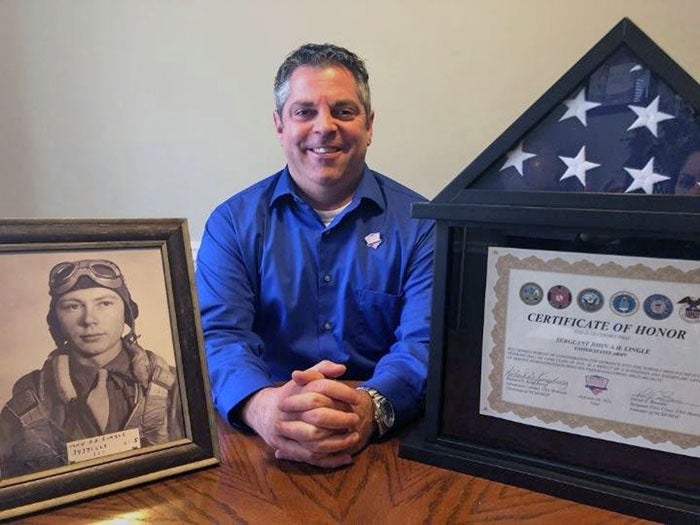Rowan native Lingle among those honored with NC Military Veterans Hall of Fame induction
Published 12:05 am Sunday, May 9, 2021

- Submitted Photo — John Wall, grandson of the late Sgt. John A. H. Lingle, accepted on his grandfather's behalf an induction into the North Carolina Military Veterans Hall of Fame, Class of 2020. Lingle, a Rowan County native, served in the Army Air Corps during World War II, received two purple heart awards and was a German Prisoner of War for several months in 1945.
By Natalie Anderson
natalie.anderson@salisburypost.com
SALISBURY — More than 30 years after his death, Rowan County native and World War II veteran Staff Sgt. John Hayden Lingle was awarded a 2020 induction into the North Carolina Military Veterans Hall of Fame.
Each year, the nonprofit North Carolina Military Veterans Hall of Fame inducts a number of military veterans across the state, often nominated by family, friends and other veterans. The nominees are then chosen by an independent selection committee, which is made up of military veterans. For 2020, there are 18 inductees, including several other Rowan Countians.
Lingle received a category one valor induction for earning significant awards for valor during an active duty combat tour.
Lingle’s only grandson, John Wall, accepted the award on his behalf. The third annual ceremony was held virtually in February due to the pandemic, but the previous year attracted an attendance of more than 530 people.
Both of Lingle’s daughters, Glenda Ball and Sue Wall, say their father likely would not find himself deserving of such an award. He often viewed his time as “doing what we needed to do.” Ball added that he viewed those on the ground engaging in hand-to-hand combat as the true heroes.
Lingle began a life of humble beginnings, growing up on a farm in Rowan County. His mother lost her husband in 1929, around the start of the Great Depression, and raised Lingle and his siblings on her own. Wall said Lingle sent his paychecks to his mother while away during World War II.
He began his service with the U.S. Army Air Corps, which would later become the Air Force, in March 1943. He was a gunner in the 392nd Bombardment Group. His group was recognized for the distinguished performance of 200 missions in Germany and other enemy-occupied territory.
Lingle was a waist gunner on the Jolly Duck, a B-24 plane that made a crash landing into the countryside near Zoeterwoude on Feb. 22, 1945. The entire 10-man crew survived, but Lingle and another crew member sustained the most serious injuries. It wasn’t long before Lingle and three others were captured by heavily armed German soldiers on motorcycles and transported to a bunker via a horse-drawn milk cart. Lingle and his crewmates were forced to march more than 600 miles through Frankfurt and Nurnberg before arriving at a prisoner of war camp in Moosburg. Lingle lost more than 60 pounds in the two months he was captured.
Lingle was liberated from his imprisonment on April 29, 1945, by Gen. Patton’s 3rd Army. He is quoted in his induction document sharing a positive impact the imprisonment provided him.
“I learned to appreciate my fellow man in a different light and the good ‘ole USA in general,” the induction document states. “Occasionally, you must lose something in order to realize what you have. I have learned to appreciate what some people take for granted.”
Ball echoed those same thoughts to the Post, recalling memories of her father savoring his meals and baths.
Lingle was honorably discharged from the military in October 1945. Following his return home, he married and had Sue in 1948, and Glenda in 1953. He began working at McCanless Motor Company before he was poached by the Rouzer family to work at their automotive business, where he worked for nearly 40 years and advanced to general manager.
Lingle died only months after his retirement and 65th birthday in 1988. Ball recalls that while Lingle was awaiting his Prisoner of War Medal he joked that he would be dead before he received it. Sure enough, a few days after his death, the medal was given to his wife on his behalf at his funeral.
Lingle’s war experiences provided teaching moments to Ball and Wall. For example, Ball recalls her father saying he didn’t mind paying taxes for this great country, and that he taught his children to honor the flag, be proud Americans and love God. Learning about his POW experience was humbling and heartbreaking, Ball said, and reminded her family that many freedoms are taken for granted each day.
Additionally, Ball said Lingle said he was glad to have been captured in Germany and not Japan because of crueler treatment. He viewed those captured in Japan as his heroes.
Both Ball and Wall worked together on their father’s nomination to the Hall of Fame. But much of what his daughters know today comes from their own research following his death. Both said Lingle didn’t often talk about the war, frequently had nightmares and would likely be diagnosed today with post-traumatic stress disorder like many other veterans. For years, both sisters only knew that he was in the war and flew a plane. When he was awarded two Purple Hearts in the 1970s, the sisters believed one was for Glenda and the other was for Sue.
“We are very proud of our daddy and what he did and what he survived,” Ball said. “We are very honored as a family to have been able to see this happen.”
Ball and four other family members, including John Wall, made a trip to Holland in 2005 to take part in a memorial ceremony near the site where her father’s plane crashed. A plaque dedicated that day honored innocent Dutch victims of the war, the men in the 392nd Bomb Group who were killed in action or captured and those who evaded capture with the help of Dutch patriots.
Contact reporter Natalie Anderson at 704-797-4246.






